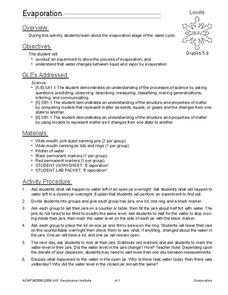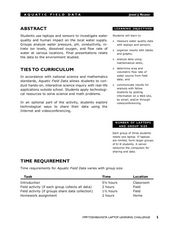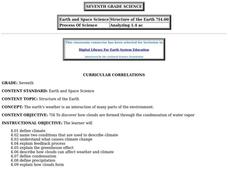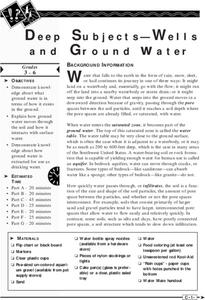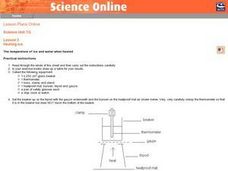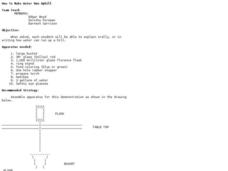Curated OER
Make Your Own Recipe
Students make their own recipe. In this art lesson, students mix dry ingredients with a little water and see the changes made.
Curated OER
Cloud Formation
Fifth graders discuss the weather and cloud formation. They rotate, in groups, through various activity stations set up in the room. Stations include activities such as researching types of clouds, drawing pictures of the water cycle,...
Curated OER
What is Everything Made of?
Students observe a demonstration on how we see space between water molecules. In this experimental lesson students discover what elements make up the things around them and discuss what they learned.
Curated OER
Making "Cents" of Surface Tension
Students explore the unique behaviors of water. They investigate surface tension using water drops on a penny and pennies dropped in a cup.
Curated OER
Ocean Currents
Learners discover the geography of Earth by analyzing water currents. In this oceanography lesson plan, students create visual references on a map of the globe where and why major ocean currents are moving water. Learners...
Curated OER
Evaporation
Students study the evaporation stage of the water cycle. In this water cycle lesson, students participate in an experiment to study the process of evaporation that uses jars and water. Students complete an observation worksheet for...
Curated OER
Aquatic Field Data
Students use laptops and sensors to measure water quality and graph their results. In this aquatics activity students post their results to a website or email.
Curated OER
Structure of the Earth
Seventh graders study the cause of climate change, and how clouds form and affect weather. They define condensation and precipitation, the greenhouse effect and the water cycle.
Curated OER
Wildlife Sampling
Seventh graders discuss water issues and its affect on salmon population. They recreate a sampling river with fish (cheddar) and scoop them to tag them (which means they exchange them for pretzel fish.) They complete a spreadsheet to...
Curated OER
Maintaining the Natural Balance
In this pollution worksheet, students will identify the sources of air, water, and land pollution. Then the students will list some of the problems caused by these types of pollutions in 3 short answer questions.
Curated OER
The Blizzard of 1993
Students read and interpret the information from a barograph from a major winter storm. This task assesses students' abilities to interpret and analyze graphs, construct data tables and graphs, generalize, infer, apply knowledge of...
Curated OER
Why Do Ice Cubes Melt?
First graders investigate water properties by participating in a hands on experiment. In this ice formation lesson plan, 1st graders examine real ice cubes in a bowl and identify the reasons why certain cubes melt faster than others....
Curated OER
Deep Subjects - Wells and Ground Water
Here is a phenomenal lesson plan on ground water, wells, and aquifers. Young geologists study how water exists underground, how water moves through the soil, and how water is extracted to be used as drinking water. Some excellent...
Core Knowledge Foundation
Taking Care of the Earth Tell It Again!™ Read-Aloud Anthology
A read-aloud anthology closely examines human impact on the Earth while boosting reading comprehension skills. Through stories, scholars examine the concepts of natural resources, pollution, garbage, and recycling and brainstorm...
University of Southern California
Wave Erosion Lab
Using a stream table, erosion enthusiasts examine how the density of sediment and how the slope of land contribute to the amount moved by waves. You will not be able to use this entire resource as is; there are teachers' names and...
Creative Chemistry
How Soluble are Salts and Hydroxides in Cold Water?
In this solubility worksheet, students are presented with a table that shows the solubility of salts and hydroxides in cold water. The table shows which salts and hydroxides are soluble and which are insoluble.
Curated OER
Heating Ice: The temperature of ice and water when heated
Seventh graders read and follow the instructions on the worksheet. They make a table of their results. Students use about 100 cm^3 of water and ice mixture. They heat the water/ice with a Bunsen burner. Temperature is recorded every 30...
Curated OER
How Can We Conserve Water?
Students describe the importance of water conservation and list ways to conserve. They construct composts and fill them with materials that recycle nutrients. They inspect their homes for leaky pipes, toilets, and faucets.
Creative Chemistry
Hard Water
In this water learning exercise, students read about how hard water is created and what can be done to soften it. Then, they complete six short answer questions.
Curated OER
Is Your Water Clean?
Students compare water quality of different sources. They test water samples for odor, phosphates, pH, bacteria, and dissolved solids. they fill out a data table and answer questions about their findings.
Curated OER
How to Make Water Run Uphill
Students observe science demonstration. In this science lesson, students watch an experiment showing water moving up from an area of higher concentration to an area of lower concentration, due to a change in atmospheric pressure.
Curated OER
Heating of Water: Water Vapour
Seventh graders read the directions printed on their worksheet and follow them carefully. They set up a beaker with a tripod and Bunsen burner under it. They record the temperature of water every 30 seconds. Students graph the data and...
Curated OER
ESL Order of Size Table
In this order of size worksheet, students put 3 lists of words in order starting with the biggest or strongest on top, and listing down from there. They order words about water, wind, and accommodations.
Curated OER
Science: Dissolved Oxygen and Water Quality Sampling
Students perform tests to determine the level of oxygen dissolved in water. After examining a table displaying the temperature and solubility of water, they examine the three stages involved in the test. Upon completion, students explain...
Other popular searches
- Aquifer Water Table
- Water Table Diagram
- Water Table and Recycling
- Water Table Erosion Sand
- Sand and Water Tables
- Making a Water Table
- Science Water Table
- Soil and Water Table
- Water Table Activities
- Location of Water Table
- The Water Table





